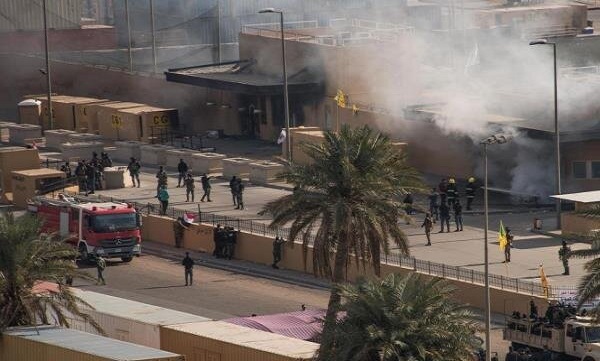Although these elections were marginalized in the stage of the announcement of results, the Shia and resistance discourse dominated the majority (53 percent of) parliamentary seats and thwarted the policies of the United States and its allies, including Saudi Arabia, the United Arab Emirates, Britain, and the Zionist regime.
The current situation the United States is facing in Iraq is influenced by the post-election atmosphere in the country. The fact is that the United States came out of the Iraqi elections empty-handed. The outflow of millions of dollars of financial investment, extensive consultations with political forces, months of complex media work and psychological operations, only led to the selection of 9 people from the US-backed list to the Iraqi parliament!
What is transpiring in Iraq right now, and which has made the country’s political and field atmosphere prone to tense and violence for several times in recent years, is a situation that has been largely influenced by US policies in the post-election period. In the aftermath of the Iraqi election, in which the defeat of the United States was evident, Biden’s security team, with the help of the CIA and some intelligence services in the region, put on their agenda plans to seriously “destabilize and insecuritize Iraq” with special working groups designated for this conspiracy.
To implement this conspiracy, two considerable issues have arisen in Iraq so far:
First, the attempt to divert peaceful protests from real and legitimate demands and turn them into violence and street clashes that could lead to chaos in Iraq. US-affiliated intelligence and operational elements have been exploiting even the part of the protests in which anti-American and anti-Zionist slogans are chanted to turn it into a platform for advancing the insecurity conspiracy in Iraq!
Second, the attack of suicide drones on the residence of Mustafa al-Kazemi is an unprecedented and dangerous act of its kind that has never been seen before in Iraq. Although immediately after the failed assassination attempt on the Iraqi Prime Minister, the US-affiliated propaganda apparatus tried to link the operation to resistance groups and the Islamic Republic of Iran, it soon became clear with measures taken, especially the visit of the Quds Force commander and his consultation with Mustafa al-Kazemi that the United States is accused of a drone strike on the home of Mustafa al-Kadhimi. The Baghdad green zone is controlled by the C-RAM defense shield of the US which is always on and in alert and reacts to any daily areal movement. Interestingly, the system was shut down by the United States a few days before the drone strikes!
As in the past, Iraq is not in a good position to continue its American presence in the country; Thus, the insecuritization of Iraq is a conspiracy that the Americans are pursuing to maintain their military, political and security presence and influence at both the hardware and software levels in Iraq.
The strategies pursued by the United States in Iraq have important implications for both the “national” and the “regional” levels.
At the national level, it can bring the political future of Iraq, especially on the eve of the formation of a parliament and the election of a new government, to political turmoil and perhaps the absence of a government. It can also lead to internal conflicts with ethnic, tribal and religious dimensions. In the context of the insecurity in Iraq, the United States has moved beyond the Shia-Sunni war and seeks to incite conflict within Shia groups and launch a “Shia-Shia war” that is very dangerous to Iraqi society and its national interests.
In the world, insecurity and instability and political chaos can cause the revival of fundamentalism and terrorism more than any other phenomena. The resurgence of Daesh dormant and inactive cells, which is considered as one of the US goals in destabilizing Iraq, could be a confident justification for maintaining the US presence in Iraq. At the same time, it is a dangerous national consequence for Iraq.
The spread of insecurity and instability in Iraq in the economic field is also harmful and generally causes the delay of development projects and the closure of economic activities in Iraq, and destroys the country’s attractiveness for foreign investment.
In addition, the spread of insecurity inside Iraq could pave the way for confrontation between the poles of power not only inside Iraq but also in the region. The United States and Saudi Arabia are the main losers in the West Asian developments, so they are trying to prevent the Tehran-Baghdad strategic alliance by any means possible.
US security moves, on the one hand, and the accumulation of political and economic problems and demands of the people, on the other, have put Iraqi society in a difficult position. The Iraqi people and various groups, especially the Shia currents and the security forces and the Hashad al-Shaabi, must increasingly unbalance and block the way forward for insecure projects by taking strategic alliances and maintaining vigilance, by taking smart and precise measures. According to the Islamic Republic of Iran, any action that disrupts order and security and disturbs stability and peace in Iraq, completes the American puzzle and is strongly condemned and should be prevented.










0 Comments